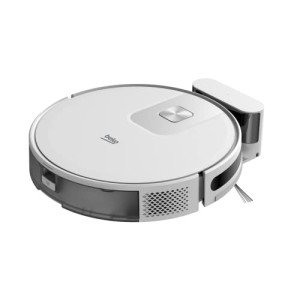14 Smart Ways To Spend Leftover Robotic Vacuum Budget
The Rise of the Robotic Vacuum Cleaner: Revolutionizing Home Cleaning
In the realm of home devices, robotic vacuum cleaners have actually emerged as one of the most significant developments over the last few years. These autonomous devices use benefit and efficiency, enabling property owners to keep cleaner home without the drudgery of manual vacuuming. This post explores the development, functionality, benefits, and factors to consider relating to robotic vacuum, together with offering insights through data tables and frequently asked questions.
A Brief History of Robotic Vacuum Cleaners
The journey of robotic vacuum cleaners began in the late 20th century, with early prototypes stopping working to make considerable strides in homes. Nevertheless, advancements in innovation led to the introduction of more refined models in the early 2000s. Business such as iRobot and Neato played an essential role in promoting these wise home gadgets.
Advancement Timeline of Robotic Vacuum Cleaners
Year
Milestone
1996
Introduce of the first robotic vacuum, the ELECTROLUX TRINITY
2002
iRobot presents the Roomba, an extensively acknowledged model
2012
Introduction of models with innovative mapping capabilities
2020
Incorporation of artificial intelligence for enhanced navigation
2023
Models with incorporated clever home connection and app control
How Robotic Vacuum Cleaners Work
Robotic vacuum cleaners make use of a mix of sensing units, mapping innovation, and expert system to navigate and tidy various surface areas efficiently. Here's a streamlined introduction of their core performance:
Sensors: Equipped with infrared or ultrasonic sensors, these gadgets can spot challenges, cliffs, and dirt, enabling them to navigate through spaces without crashing into furniture or toppling down stairs.
Navigation: Most modern-day robotic vacuum cleaners incorporate clever mapping innovations, permitting them to map out the home layout and enhance cleaning paths.
Cleaning Mechanism: Using brushes and suction power, robotic vacuums gather dirt, dust, and debris from different floor types, including carpets and wood.
Charging and Cleaning Schedules: After completing a cleaning session or when their battery runs low, these robotics automatically return to their charging dock. Users can set cleaning schedules by means of smart device apps, helping preserve a neat home effortlessly.
Benefits of Robotic Vacuum Cleaners
Robotic vacuum offer various benefits over standard vacuuming techniques. Here are some of the key advantages:
- Time-Saving: Automated cleaning suggests house owners can designate their time to other activities.
- Convenience: Scheduling cleaning sessions enables a tidy home without manual intervention.
- Thorough Cleaning: Many robotic designs feature specialized brushes to take on family pet hair and provide deep cleaning on carpets and rugs.
- Smart Home Integration: Many units work with smart home systems, offering voice control and remote management.
Popular Features in Robotic Vacuum Cleaners
Feature
Description
Mapping Technology
Develops a digital map of the cleaning location
Mobile App Control
Provides users the capability to start/stop or schedule cleaning sessions remotely
Self-Cleaning
Some models have docking stations that can self-empty dust bins
Advanced Sensors
Finds dirt more effectively and browses much better
Voice Control
Suitable with virtual assistants like Alexa and Google Assistant
Factors to consider Before Purchasing a Robotic Vacuum Cleaner
While robotic vacuum provide numerous benefits, possible purchasers ought to consider a few aspects before buying. Here are some indicate remember:
Key Factors to Evaluate
Floor Type: Certain models carry out much better on carpets while others excel on tough floors. Buyers must pick versatile vacuums if they have mixed flooring.
Battery Life: Longer battery life permits extended cleaning sessions. Try to find models that can cover big areas without frequent recharging.
Dustbin Capacity: A bigger dustbin minimizes the frequency of clearing, making cleaning less labor-intensive.
Noise Level: Some designs operate quietly, which is ideal for homes with children or sensitive family pets.
Maintenance: Users need to also evaluate the ease of maintenance, specifically for filters and brushes.
Potential Drawbacks
- Price: Robotic vacuum can be substantially more costly than standard vacuums.
- Effectiveness: While they efficiently maintain cleanliness, they might not constantly match the deep cleaning effectiveness of manual vacuums.
- Obstacle Navigation: Some designs may struggle with specific types of furnishings or cluttered locations, potentially leading to missed areas.
FAQs About Robotic Vacuum Cleaners
Q1: How typically should I run my robotic vacuum cleaner?
A1: It generally depends on your home. For homes with animals or high foot traffic, running it day-to-day is advantageous. In hop over to these guys , you might find every other day is sufficient.
Q2: Can robotic vacuum cleaners deal with carpets?
A2: Most robotic vacuums can clean carpets; nevertheless, features such as suction power and brush style can significantly affect their efficiency on different carpet types.
Q3: Are robotic vacuum good for animal hair?
A3: Yes, many models are specifically designed to select up pet hair and come with specialized brushes to prevent tangling.
Q4: What takes place when the vacuum lacks battery?
A4: Most robotic vacuums automatically return to their charging dock when their battery is low, ensuring they are prepared for the next cleaning session.
Q5: Can I manage my robotic vacuum with my smartphone?
A5: Yes, lots of robotic vacuum cleaners come geared up with mobile apps that permit you to arrange cleansings, screen progress, and receive notifications.
Robotic vacuum represent a significant improvement in home-cleaning technology, combining benefit with effectiveness to essentially change how homes keep tidiness. As developments continue to emerge, these devices are ending up being increasingly capable, providing users not only time-saving services but also improved cleaning experiences. As the market continues to grow, possible purchasers are encouraged to weigh the features, benefits, and factors to consider carefully to find the very best design customized to their distinct requirements. Whether it's a hectic family, a family pet fan, or someone looking for automation in their cleaning routine, there's likely a robotic vacuum cleaner that fits the costs.
